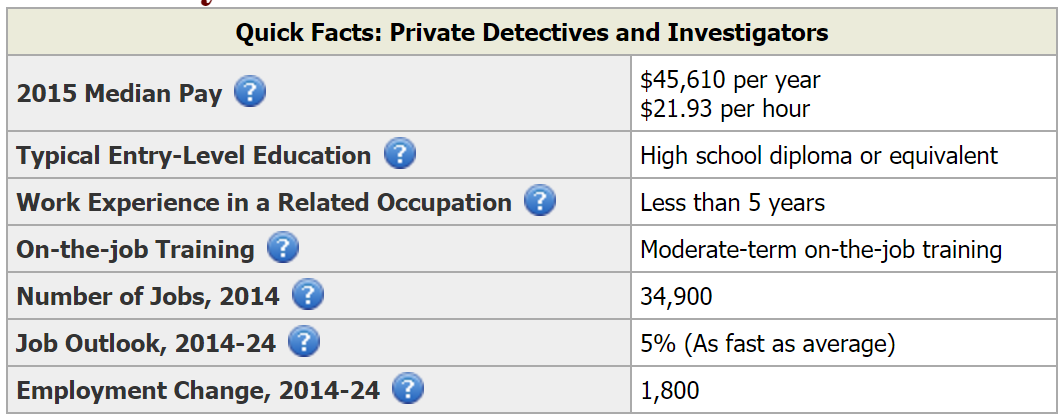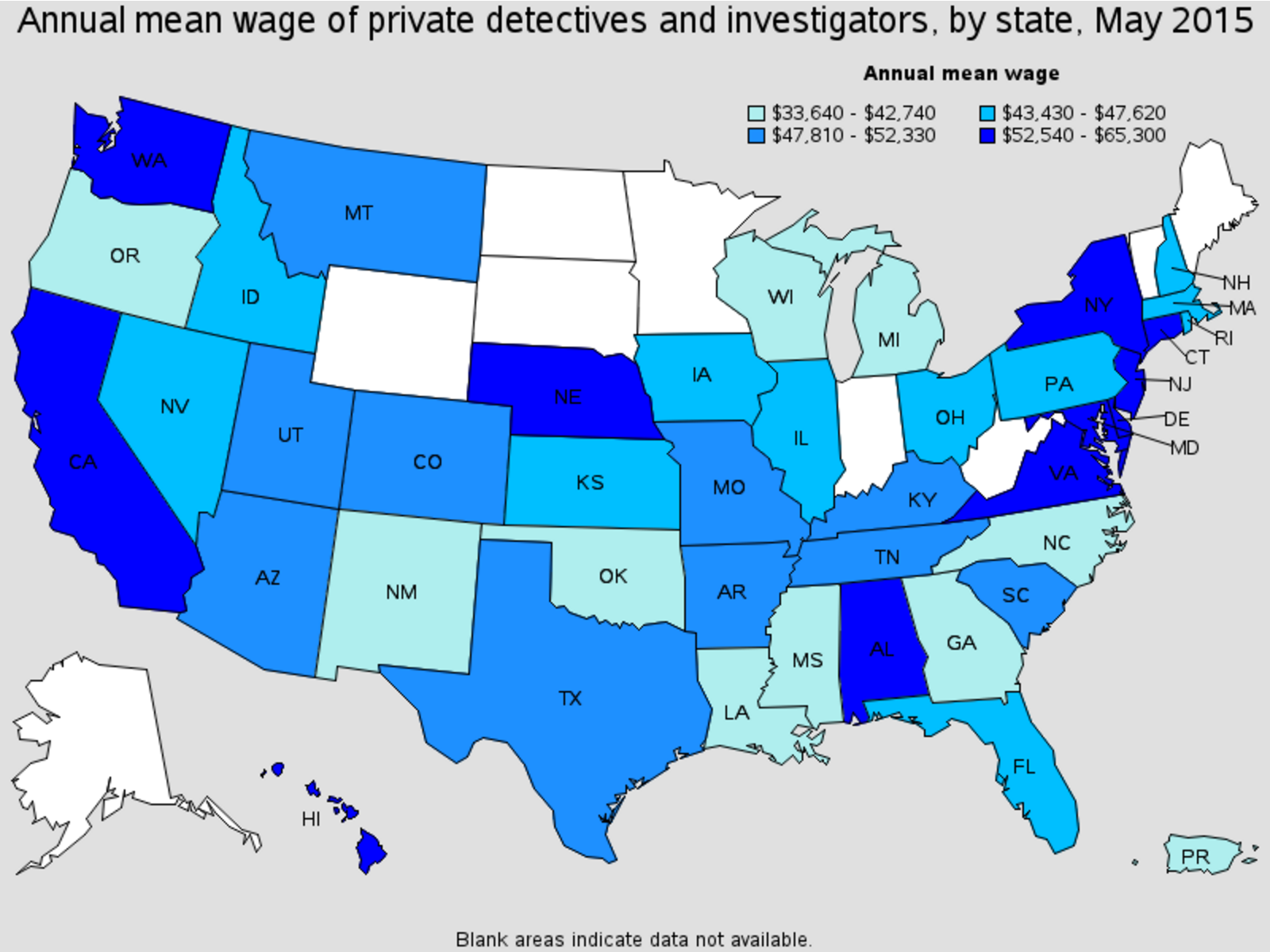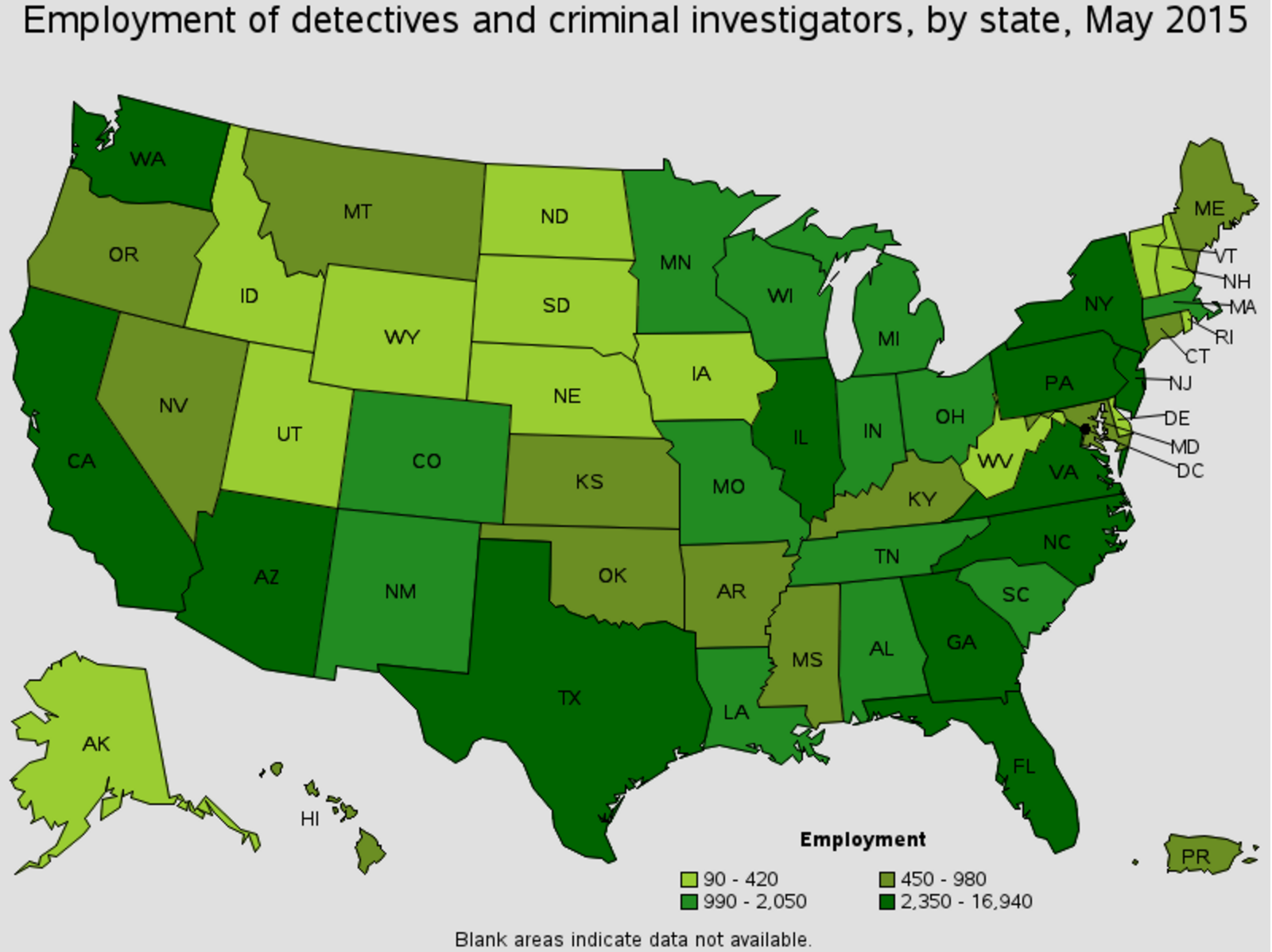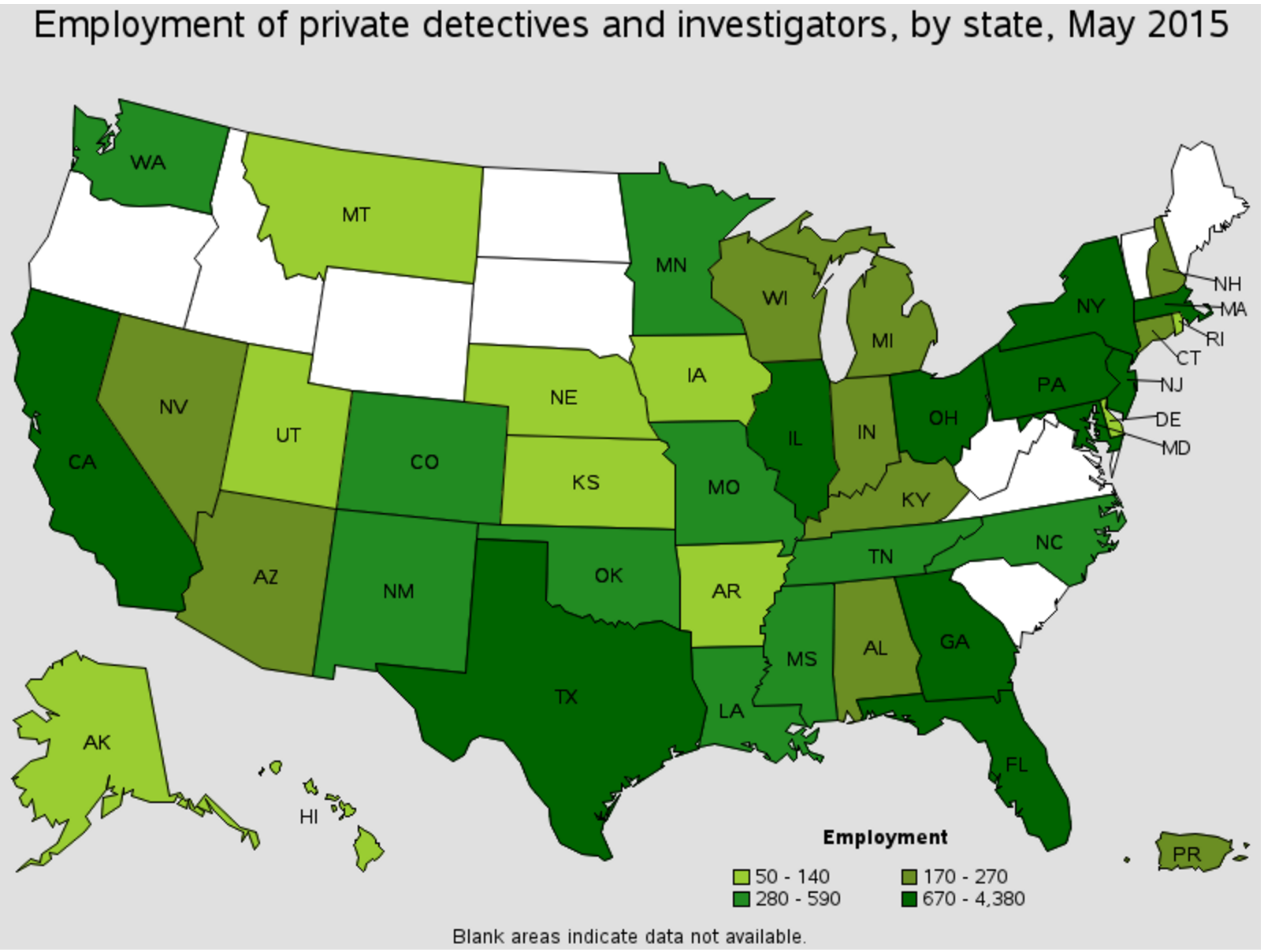Those who are fond of watching detective serials and movies want to become a detective in the future as well. The thrill of deducing never really leaves us especially after getting to know the character of Sherlock Holmes. But this dream seems to be forgotten and we will work to more realistic goals. Crime rate continue to increase that is why the need for detectives to solve them rises. Thus, some police officers step up and exhibiting what Sherlock Holmes does. If becoming a detective someday is a burning desire of yours, the information listed below is a great help.


Table Of Contents
- Average Detective Salary
- Detective Career Outlook
- How To Become A Detective
- Detective Job Description
How Much a Detective Earns
The base salary of a detective first depends on his or her employer. In most circumstances, a state employed investigator earns more than a private one. This is mostly due to steady work that they receive compared to the intermittent work of a private detective.The reason behind this is they always have work to do compared to a private detective. The national average for a state-employed detective is $76,000. Whereas the average salary for a private detective can be around $45,000. We shall discuss factors affecting a PI’s salary later. For now, let us look at the factors that affect the salary of state employed investigators.
[asd_program_button /]Size of population
Just like police officers, the income of a detective is dependent on the city’s population. If the city is more populated, then the number of cases that need to be handled also rises. In this case, the salary will increase. Similarly, crime rate also plays a major factor in deciding the salary of an investigator. For instance, someone in the LA police department will get an average salary of $44,000 to $88,000. Whereas, a member of the Miami Police department usually get $86,000 to $107,000 salary.

Location of job
The location is closely related to the population of the place and the crime rate. However, another factor comes into play in such conditions – cost of living. A detective will be paid higher if the cost of living in that certain location is higher. This is true with the case of private investigators as well. District of Columbia, Alaska, and New Jersey all pay 6-figure salaries with District of Columbia paying as much as $116,000.
Education background
For any police job (except at the federal level), a high school degree is sufficient. States have different rules but a higher education certificate is not necessary in some states. However, officers and detectives are paid more if they have a degree after high school as there are states and departments who consider higher education important. This can be an associate, bachelor or a master’s degree. Depending on your degree, you might be paid more.
Experience
You will be paid as an investigator if you will be working in the field for a long period of time. An increase of up to $20,000 will be given to those who work in the field for 20 years if they don’t get a promotion. But if you are promoted as a Police Chief, you will be paid about $180,000 per year.
Paramus Private Investigators
A private investigator’s salary depends on the number of cases he or she takes and solves. The location, amount of discretion needed, amount of danger involved, required extra equipment and other many things are the factors mentioned above that can affect the price. The price for the job will be quoted by the investigator after the problem is presented by the clients.

A state-employed detective has a steady income that will increase by various means as described here. On the other hand, a private investigator’s salary is quite unpredictable and will only increase if he or she is already popular or known. The path to choose will be determined based in the financial facts you have.
Career Outlook of a Paramus Detective
What we are going to talk about first is the growth in the fields. In 2015, the recorded public detectives or criminals investigators are about 106,000. On the other hand, there were only about 30,000 private investigators holding a job at the same time. There is a predicted growth of 5% in the industry of private detectives. Meaning to say, in 2025 the new jobs open will reach 1,500. This is the same growth rate of 5% in different sectors. This figure is only 4% for public investigators. This means there is going to be around 4,000 more jobs as a criminal investigator by 2025. This too is an average rate of growth.
[asd_program_button /]The employment increases steadily because the population increases. As the population increases, more people need to be protected and more criminals need to be caught. However, with stricter laws and more advanced technology being use, the crime rate isn’t increasing that significantly. Hence, there is a balance in each other, which leads to average growth in both careers.

In terms of location, Texas, California and New York have the highest number of Criminal/Law Enforcement Investigators. The employment in western states and Texas are higher that to that of the eastern parts. Private detectives are prominent in California, Texas and Florida with the southern states tending to employ more compared to the northern ones.
Let’s move on to the industries that hire most of these two professionals. Criminalinvestigaors are being hired mostly by The Local, State government and the Federal branch. Whereas private detectives are being hired by Security Services, Consulting services and the local government for consultation purposes on a few cases.
Criminal investigators get higher payments than the private ones. Criminal investigators receive $80,000 as average salary annually while Private investigators earn $52,000 only. When you combine the aspects of geography and finance, you see that District of Columbia, Alaska, and New Jersey paid the most (6 figure salaries) for Public investigators. Private detectives receive higher payment in Alabama, Nebraska, and New Jersey.
Comparing with different industries again, we see that for private industries, the most employing industries do not pay the highest. In fact, Electromedical, Navigational, Power generation, Metal Product forming and other such industries paid the most for private detectives since they had the most sensitive information to protect. Moving on to Public Investigators, federal agencies, postal services, and educational institutes pay the most.

Qualifications to Become a Paramus Detective
Detectives come in two kinds. General public can hire some private investigators to investigate certain things. The others are employed by the government and reach this post after being promoted from a police officer. We are going to explore here the different avenues.
[asd_program_button /]Complete High School
A detective is generally a police officer who has been promoted to that position because of his or her skills of deduction. This only means that you will need to complete your high school studies and become a police officer before you can become a detective. A high school degree is likewise necessary if you want to be a private investigator.
Get Yourself a Bachelor’s Degree
Usually, you don’t require a bachelor’s degree to get into the police academy. However, some police officers prefer to have one as a means of employment after they retire. A bachelor’s degree is also required to pursue any jobs at the federal level or become a detective.
A bachelor’s degree in either criminal justice or law will be required in most institutions to become a detective. If you have an associate’s degree, you will need at least 5000 hours. On the other hand, someone with a bachelor’s degree needs only 4000 hours of training.
Get the right amount of experience
Professional experience as an investigator is required in order to become a professional detective. You can find several ways to do so. But in most cases, it will require you to be employed by the government. If you have any experience as an arson investigator, criminal investigator or a law enforcement investigator, you are qualified as a person with experience. However, you can also choose to work as a licensed repossessor or office investigator.
The experience required might vary from one state to another. A state might require at least 3 years of experience, but in some it could be as long as 5 years.
Get firearms permits
Investigators who don’t have a firearms permit are prohibited from carrying their guns. Some firearms require a full training course after which they are issued with the permits. Therefore if you want to own a firearm while working as an investigator, completing the training course is necessary to get your own permit.
Obtain New Jersey licensure
A licensure test is required after you have all the requirements needed. The test will include questions regarded state laws and have multiple choices to choose from. The test is only available for those who want to be private detectives. If you managed to pass, you will become a licensed private investigator.
File for New Jersey insurance
Since investigating can sometimes be a dangerous line of work, it is important to get insurance done. Basically, this is a medical insurance worth $10,000. However, getting an even higher amount when you bring a firearm is necessary since you need to have some protection with you.
By completing these steps, you’ll be good to go. You can now start living the detective life you always wanted. However, don’t forget that being a detective would mean exposing yourself to danger. If you are still up for it, find out all the education requirements in detail and get started on them right away!
Responsibilities of Being a Detective in Paramus
Crime Scene Investigation
One of the main duties of a detective is to analyze a crime scene and deduce certain assumptions from it. He will then collect any evidence he can find in the crime scene. Supposedly, they should collect anything that looks like an evidence which can be used in court hearings later. In some cases, detectives can receive aid from the forensic investigation department, hence allowing them to come up with more deductions regarding the crime. To collect more clues and evidence, detectives will need to go door to door and ask any possible eye witnesses.
[asd_program_button /]Criminal Research
One of the core aspects of a detective’s duty is doing research and groundwork regarding previous cases. This is so that they can have an insight regarding criminal patterns and behaviors. In most cases, this will mean researching into previous records for them to know how the culprit might operate. In cases of serial killers or ‘copycats’, research helps a lot. This also helps detectives take down drug cartels by allowing them to identify any tactics being used. Other general research can help them narrow down a suspect better or deduce the crime scene in a more efficient way.
Narrowing down suspects
A detective’s main objective is to take the one at fault to justice. However, they will need to come up with a list of suspects first. The list could be long, including up to a hundred people, or short – sometimes none at al. They create this suspect list by drawing conclusions from the evidence gathered at the crime, eyewitnesses, research and a bit of criminal/forensic psychology. By means of getting statements from suspects, detectives are able to narrow down their list. Once the list is narrowed down, they will then proceed to gathering evidence or having the suspect admit to his crimes.
Testifying In Court
Lastly, detectives will see to it that justice is served properly. The court will sometimes summon the detective to the court to aid with the process. In some cases, they will describe the evidence and how they are connected to the suspect, as well as narrating the possible crime scene. Sometimes, the detectives are also required to escort the culprit to jail.
Paramus Private Detectives
The above duties are what a detective is expected to do. The job description of a detective is a bit loose. They will need to fulfill the needs of their clients especially when it comes to research. However, they can only go as far as certain laws will allow them when going on with their job. Private detectives are often hired for tasks such as gathering evidence from someone, monitoring certain individuals, or even tracking finances. They have to be subtle in their ways and act as a normal citizen in carrying out the duties of a detective. Moreover, arresting someone is out of their jurisdiction.
You see, the “Idiot Box The thing is, the duties and roles detectives undertake every single day are very stressful. Such things aren’t even shown on the TV. They are always supposed to look over their shoulder and ensure they do not miss any single clue since lives literally depend on them. If you think being a detective is the right job for you, then you should do research about it now!
